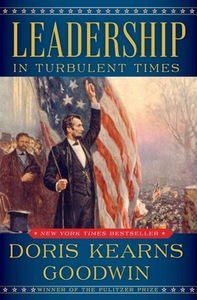Take a photo of a barcode or cover
I am a life long student (and sometimes teacher) of American history, and Goodwin is surely one of the greatest writers of that genre. This book is a deep look at the political leadership evolution of Lincoln, Theodore and Franklin Roosevelt, and Lyndon Johnson, all of whom she has written about in previous works and therefore know well (she worked directly for Johnson, including on his memoirs). Here, she focuses on the development of each of the presidents' leadership styles, starting with their childhoods and early years (in which each man had to overcome physical and social challenges, though the Roosevelts were from wealth and Lincoln and Johnson were not). She then takes us through the difficult and turbulent years of their presidencies. While the men had many differences in their lives and styles, and in their political careers, each evolved his own successful brand of leadership - with some common traits such as listening, focusing, organizing, and bringing people together in a common cause - that enabled them to lead the country through their unique eras. A particularly timely perspective for America.
I've greatly enjoyed this book by Goodwin as well as her book on Lincoln. I've also picked up her book on Theodore Roosevelt and look forward to reading it as well. Goodwin does an excellent job of bringing history of life in a compelling and engaging way. In this book, she focuses on the leadership qualities of four of our greatest presidents and how their unique skills and intelligence allowed them to bring out lasting change in our nation. She focuses on the leadership of Abraham Lincoln that brought about the transformation of our nation through the passage of the Emancipation Proclamation. Theodore Roosevelt's crisis leadership during the coal strike that nearly brought the nation to its knees. Franklin Roosevelt's turnaround leadership that brought about the great changes in the New Deal, and Lyndon Johnson's visionary leadership in bringing about Civil Rights Reform. Now, Goodwin is a democrat and that can be seen in her writing but she does give good attention to each man as an individual and does strive to keep ideology outside of the analysis of history and that makes this a book worth reading regardless as to which side of the political aisle you sit on. A great book on presidential history as well as a study on leadership.
Think of this book as the literary equivalent of that greatest of television tropes, the clip show. Doris Kearns Goodwin has written, and written well, on Lincoln (Team of Rivals), Teddy Roosevelt (The Bully Pulpit), FDR (No Ordinary Time), and LBJ (Lyndon Johnson and the American Dream). Thus, she's already done the legwork for 'Leadership: In Turbulent Times,' a book comparing the presidencies of Lincoln, TR, FDR, and LBJ. As with a clip show, there's nothing new here. As with a clip show from a particularly beloved series, that's fine: we're happy to revisit the greatest hits.
Why? Because Goodwin is a gifted writer and extraordinary popular historian, able to make the past and its personalities come alive, in all its vibrant relevance, for her audience. If you've read Goodwin's earlier work, you probably won't learn much from 'Leadership: In Turbulent Times.' If you've read Goodwin's earlier work, you probably won't mind. Reading Goodwin is its own reward.
Why? Because Goodwin is a gifted writer and extraordinary popular historian, able to make the past and its personalities come alive, in all its vibrant relevance, for her audience. If you've read Goodwin's earlier work, you probably won't learn much from 'Leadership: In Turbulent Times.' If you've read Goodwin's earlier work, you probably won't mind. Reading Goodwin is its own reward.
Def got some leadership in sight. Not my favorite book that I have ever read/
I will definitely need to read again but this is a nice overview of 4 presidents with key points to take away from their leadership styles.
It did feel like a highlight film of other books but this is the first of her books I’ve read so it didn’t stand out as much to me as it would to others.
I really enjoyed learning about their situational leadership.
It did feel like a highlight film of other books but this is the first of her books I’ve read so it didn’t stand out as much to me as it would to others.
I really enjoyed learning about their situational leadership.
A great book that mixes US history with observations about leadership, by following the lives of 4 US presidents: Abraham Lincoln, Theodore Roosevelt, Franklin Roosevelt and Lyndon Johnson.
The book goes through their youth and formation, the considerable adversity they faced in their lives, the generally non-linear routes that led them to the presidency, the presidencies themselves (including the leading of significant social change in the country such as the abolition of slavery, labor disputes, the New Deal, civil rights movement) up to later years and death. The book is structured by life stage, allowing similarities and differences in the presidents' life paths and approaches to leadership to emerge naturally.
I found the book worthwhile both for its history lessons as well as for the more implicit lessons in leadership (overcoming adversity, finding personal strengths, becoming a great communicator, leaning on empathy and collaboration, etc.). I do think it's fair to say that the book doesn't do full justice to either these eras of US history or leadership, there are better books to learn about both topics. And while I found the book engaging enough (not being a huge history buff), I can't say I found it a particularly exciting read.
The book goes through their youth and formation, the considerable adversity they faced in their lives, the generally non-linear routes that led them to the presidency, the presidencies themselves (including the leading of significant social change in the country such as the abolition of slavery, labor disputes, the New Deal, civil rights movement) up to later years and death. The book is structured by life stage, allowing similarities and differences in the presidents' life paths and approaches to leadership to emerge naturally.
I found the book worthwhile both for its history lessons as well as for the more implicit lessons in leadership (overcoming adversity, finding personal strengths, becoming a great communicator, leaning on empathy and collaboration, etc.). I do think it's fair to say that the book doesn't do full justice to either these eras of US history or leadership, there are better books to learn about both topics. And while I found the book engaging enough (not being a huge history buff), I can't say I found it a particularly exciting read.
'Leadership in Turbulent Times' is a deep dive into the individual leadership styles of four great American presidents - Abraham Lincoln, Theodore Roosevelt, Franklin Roosevelt and Lyndon B Johnson. The book not only describes how they led, but how the events in each presidents life, crafted their skills. This is a great pick for those interested in US history. The audiobook was also very well done.
.
.
informative
slow-paced
challenging
informative
inspiring
reflective
slow-paced
Goodwin's approach to the age old question-how leaders are made?- is quite creative given that out of a plethora of American Presidencies she elects four of the most dynamic incumbencies. Her focus is on Abraham Lincoln, Theodore Roosevelt Jr., Franklin D. Roosevelt and Lyndon Johnson. The last three are interconnected by family (the Roosevelts) and proximity (D. Roosevelt and Johnson) with Lincoln the odd one out. I believe that her selection criteria was based on the times rather than these leaders' response to those times. Lincoln confronted disunion and war; Roosevelt Jr. commercial monopoly; D. Roosevelt Economic Depression and WWII while Johnson tackled the tendentious issue of Civil Rights.
Goodwin narrates the various crisis's these Presidents confronted and their ultimate response to them. This response decided their depth of character and profundity of intelligence. Their claim to leadership was evinced in how they tackled the conflict staring them in the face. Lincoln adopted the iron fist in velvet glove stratagem; Theodore pushed through with his strategy of being the center of affairs; Franklin assiduously disassociated his administration from the past and embarked on breaking new ground while Johnson silently operated from the shadows and triumphed with his Quid pro Quo and Show not Tell policy. The hallmark of all four Presidencies was that their holders succeeded in what they set out to do. Lincoln preserved the Union; Roosevelt Jr. upended corruption; Franklin Roosevelt restored fiscal stability and outproduced the Axis while Johnson pushed through the Civil Rights Bill.
This book, in contrast to 'A Team of Rivals', is free of jargon and retains an unique flow which prevents it from becoming a tedious bore. The prose is handsome, to say the least, with the downside being the almost anti-climatic conclusion of the book. The most pertinent question though is that does Doris effectively answer what makes a leader? And here is a glaring failure, not clearly enough. Otherwise, this is an excellent book regards historic reference.
Goodwin narrates the various crisis's these Presidents confronted and their ultimate response to them. This response decided their depth of character and profundity of intelligence. Their claim to leadership was evinced in how they tackled the conflict staring them in the face. Lincoln adopted the iron fist in velvet glove stratagem; Theodore pushed through with his strategy of being the center of affairs; Franklin assiduously disassociated his administration from the past and embarked on breaking new ground while Johnson silently operated from the shadows and triumphed with his Quid pro Quo and Show not Tell policy. The hallmark of all four Presidencies was that their holders succeeded in what they set out to do. Lincoln preserved the Union; Roosevelt Jr. upended corruption; Franklin Roosevelt restored fiscal stability and outproduced the Axis while Johnson pushed through the Civil Rights Bill.
This book, in contrast to 'A Team of Rivals', is free of jargon and retains an unique flow which prevents it from becoming a tedious bore. The prose is handsome, to say the least, with the downside being the almost anti-climatic conclusion of the book. The most pertinent question though is that does Doris effectively answer what makes a leader? And here is a glaring failure, not clearly enough. Otherwise, this is an excellent book regards historic reference.

